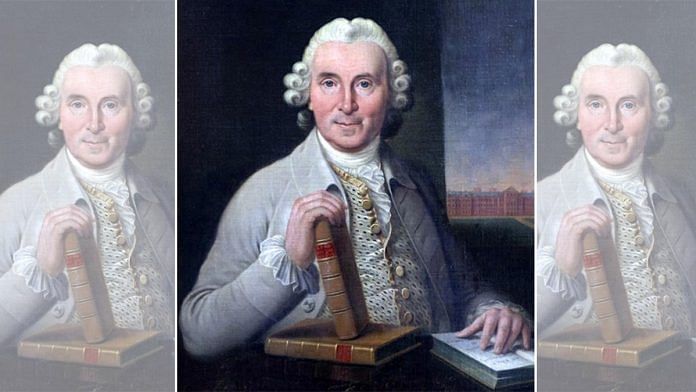New Delhi: With the coronavirus pandemic ravaging countries across the globe, clinical trials have made headlines more than ever before.
On 20 May, the International Clinical Trial Day is observed. The commemoration comes every year to mark the day when Scottish doctor James Lind performed the first ever clinical survey in 1747.
“International Clinical Trial Day is an opportunity for research organisations, clinical research professionals, and the public to acknowledge the achievements that result from clinical research and to discuss various trial topics,” notes the European Clinical Research Infrastructure Network, the body that launched this day in 2005.
On this day, here’s a look at the man behind the first clinical trial.
Also read: A cascade of rare complications is deepening India’s Covid misery
The Lind story
James Lind’s trial was prompted by his need to study Scurvy, a disease caused by the lack of Vitamin C. The disease had claimed the lives of many men at sea during the 18th century, and was believed to have multiple causes including diet, foul air and lack of exercise.
In his three-part book titled A Treatise of the Scurvy, Lind’s mention of conducting the first-ever trial could be easily missed, occupying just four of the 450 pages and with no subhead.
According to the James Lind Library, his “trial involved twelve sailors with scurvy, who were ‘as similar as I could have them,’ who were accommodated in the same quarters (the forehold), and had the same basic diet”, underlining his understanding of selection bias as he kept the clinical condition, environment, and basic diet constant. Two men each were following six different daily treatments.
The treatments were: “1.1 litres of cider; twenty-five millilitres of elixir vitriol (dilute sulphuric acid); 18 millilitres of vinegar three times throughout the day before meals; half a pint of sea water; two oranges and one lemon continued for six days only (when the supply was exhausted); and a medicinal paste made up of garlic, mustard seed, dried radish root and gum myrrh.”
The orange and lemon combination showed the best results. However, Lind refrained from categorically listing his recommendations in his book.
Lind authored two other titles in his lifetime — An essay on the most effectual means of preserving the health of seamen in 1762 and An essay on diseases incidental to Europeans in hot climates 1771.
A plaque at the Edinburgh University quadrangle in Teviot Place states these works to be the reason behind conquering “scurvy, the development of modern naval hygiene, and the growth of tropical medicine”, calling Lind ‘The Hippocrates of Naval Medicine’.
However, despite such achievements, little was known about the man himself. An anonymous author in a paper titled Heroes of Medicine: James Lind, published in the medical journal The Practitioner, wrote: “James Lind has been the means of saving innumerable lives and preventing an incalculable amount of suffering; yet even to the members of his own profession today his name is almost unknown. Of his life even less is known than that of Shakespeare.”
Value of clinical trials
Randomised clinical trials are “the most rigorous way of determining whether a cause-effect relation exists between treatment and outcome and for assessing the cost effectiveness of a treatment”.
Their importance is only further heightened during a pandemic like the one being faced worldwide now.
While non-random clinical trials do have their advantages, a random trial “ensures no systematic differences between intervention groups in factors, known and unknown, that may affect outcome”.
However, many have argued a random clinical trial to be unethical — for “exposing patients to an intervention believed to be inferior to current treatment”.
Also read: India’s first home kit for Covid test to hit stores next week. Here is how you can use it



